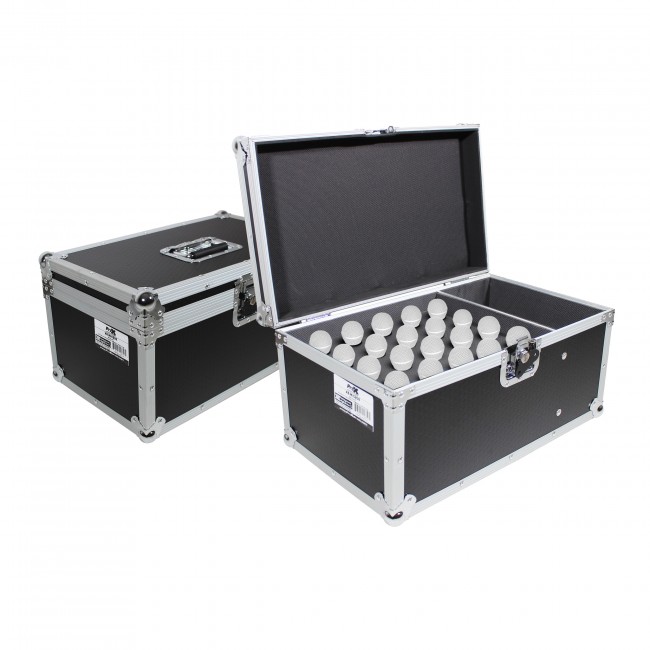
Microphone cases come in various shapes and sizes to fit different types of microphones. They provide a layer of protection against dust, moisture, and physical damage. Made from durable materials, these cases often include padded interiors and compartments for accessories.
Choosing the right case can extend the lifespan of your microphone and maintain its performance. Whether you are a professional or an amateur, investing in a high-quality microphone case is crucial. Keep your equipment safe and secure, ensuring it is always ready for use. This small investment can make a significant difference in the longevity and functionality of your audio gear.

Credit: www.proxdirect.com
Importance Of Microphone Cases
Microphone cases are crucial for keeping your microphones safe. They help extend the lifespan of your equipment. A good microphone case ensures that your investment is well-protected. Let’s explore why these cases are so important.
Protecting Your Investment
Microphones can be expensive. They are an investment for musicians and sound engineers. A sturdy microphone case shields your gear from potential hazards.
Waterproof cases protect your microphone from moisture. Shockproof cases guard against falls and impacts. Investing in a quality case ensures your microphone stays in top condition.
Preventing Damage
Microphones are delicate instruments. They can get damaged easily. A microphone case provides a safe environment. It keeps the microphone secure during transport.
The following table outlines common microphone damages and how cases prevent them:
| Type of Damage | Prevention by Case |
|---|---|
| Moisture | Waterproof case lining |
| Physical Impact | Shock-absorbent foam |
| Dust | Sealed zippers |
Using a microphone case ensures your gear is always ready to perform. It prevents unnecessary repairs and replacements.
You Find Best Wireless Microphones for You? Click Here.
Types Of Microphone Cases
Microphone cases are essential for protecting your valuable equipment. There are different types of microphone cases available. Each type offers unique benefits. Let’s explore the most common types: hard cases and soft cases.
Hard Cases
Hard cases provide superior protection. They are made from durable materials like plastic or metal. These cases are designed to withstand impacts. They keep your microphone safe during transport. Here are some features of hard cases:
- Durability: Hard cases are very tough.
- Protection: They offer excellent protection from damage.
- Waterproof: Many hard cases are waterproof.
- Locks: Some come with secure locks for extra safety.
Hard cases are ideal for professionals. They are perfect for travel and harsh conditions.
Soft Cases
Soft cases are lightweight and easy to carry. They are made from materials like fabric or leather. These cases offer a good balance of protection and convenience. Here are some features of soft cases:
- Lightweight: Soft cases are easy to carry.
- Flexible: They can fit in tight spaces.
- Affordable: Soft cases are usually less expensive.
- Comfortable: They often have padded interiors.
Soft cases are great for casual use. They are suitable for everyday transport and storage.
| Feature | Hard Cases | Soft Cases |
|---|---|---|
| Durability | High | Moderate |
| Protection | Excellent | Good |
| Weight | Heavy | Light |
| Price | Higher | Lower |
Materials Used In Microphone Cases
Microphone cases protect your valuable audio equipment. Knowing the materials used in their construction helps you choose the best case for your needs. Different materials offer varying levels of durability, protection, and style.
Plastic And Metal
Plastic cases are lightweight and affordable. They are easy to carry and often come with foam padding inside. Plastic is a good choice for casual use and light travel.
Metal cases provide the highest level of protection. They are durable and resistant to impacts. Metal cases often have reinforced corners and secure locking mechanisms. They are ideal for professional use and heavy travel.
Foam And Fabric
Foam linings inside cases offer cushioning. They protect your microphone from shocks and vibrations. Foam can be cut to fit specific microphone shapes, ensuring a snug fit.
Fabric covers are used for soft cases. They are lightweight and flexible. Fabric cases are easy to store when not in use. They provide basic protection against dust and minor impacts.
| Material | Advantages | Use Case |
|---|---|---|
| Plastic | Lightweight, affordable | Casual use, light travel |
| Metal | Durable, high protection | Professional use, heavy travel |
| Foam | Cushioning, shock absorption | Internal padding |
| Fabric | Lightweight, flexible | Soft cases, basic protection |
Understanding the materials used in microphone cases ensures you choose the right one. Consider your specific needs and how often you travel. The right case will keep your microphone safe and sound.

Credit: gatorco.com
Features To Look For
Choosing the right microphone case ensures the safety and longevity of your equipment. Here are key features to consider for the best protection and performance.
Padded And Insulation
The padding and insulation of a microphone case are crucial. Thick padding protects from shocks and drops. Insulation prevents damage from extreme temperatures. Look for cases with foam inserts or padded walls. These features secure the microphone in place and absorb impact.
Water Resistance
Water resistance is another essential feature. A water-resistant case protects against spills and rain. Check for cases with sealed zippers or waterproof materials. This ensures your microphone stays dry and functional. Such cases are perfect for outdoor use or travel.
Custom Vs. Universal Cases
Choosing between a custom microphone case and a universal microphone case can be challenging. Each option has unique benefits. This section will help you decide which one suits you best.
Pros And Cons
| Custom Cases | Universal Cases |
|---|---|
| Pros: Perfect fit for your microphoneBetter protectionPersonalized design Cons: Higher costLonger production time | Pros: Lower costReadily availableFits multiple models Cons: Less protectionGeneric design |
Choosing The Right Option
Consider your budget and specific needs when choosing a case. A custom case offers better protection and a perfect fit. This is essential for expensive microphones. A universal case is more affordable and versatile. This is ideal for those with multiple microphones.
Think about how often you transport your microphone. Frequent travel may require a custom case. A custom case provides better durability. If you use your microphone mainly at home, a universal case might be sufficient.

Credit: www.amazon.com
Best Brands For Microphone Cases
Choosing the right microphone case is crucial for protecting your gear. Durability, design, and affordability are key factors. This guide explores the best brands for microphone cases. Let’s dive in.
Top-rated Options
| Brand | Features | Price Range |
|---|---|---|
| Gator Cases | Rugged designWater-resistantCustomizable foam inserts | $$$ |
| Pelican | CrushproofWatertight sealPressure equalization valve | $$$ |
| Shure | Compact sizeShock-absorbing foamLightweight | $$ |
Budget-friendly Choices
For those on a budget, there are still quality options. Here are some great choices that won’t break the bank:
- Monoprice: Offers basic protection with a sturdy build. Great for casual use.
- AmazonBasics: Provides good value with durable materials. Ideal for beginners.
- Neewer: Known for affordability and decent protection. Perfect for hobbyists.
These budget-friendly brands offer reliable protection without high costs. Choose one that fits your needs and budget.
Maintaining Your Microphone Case
Proper maintenance of your microphone case ensures its longevity. It also keeps your equipment safe. Follow these tips to keep your microphone case in top condition.
Cleaning Tips
Regular cleaning prevents dirt buildup. Use a soft, damp cloth for the exterior. For stubborn spots, use mild soap. Avoid harsh chemicals as they can damage the case material.
Inside the case, use a vacuum with a brush attachment. This helps to remove dust and debris. Be gentle to avoid damaging the interior lining.
Regular Inspections
Inspect your microphone case regularly. Check for any signs of wear and tear. Look for cracks, broken latches, or other damage.
Ensure the zippers or latches work properly. Faulty closures can compromise your microphone’s safety. Replace any damaged parts immediately.
Inspect the interior padding. Make sure it provides sufficient protection. Replace worn-out padding to maintain the safety of your microphone.
Where To Buy Microphone Cases
Finding the right microphone case can be a challenge. It protects your gear and ensures it lasts longer. Knowing where to buy is crucial for quality and price.
Online Retailers
Online retailers offer a wide range of microphone cases. These platforms provide detailed descriptions and reviews. Popular online stores include:
- Amazon: Known for its vast selection and competitive prices.
- eBay: Offers both new and used cases, often at a bargain.
- Sweetwater: Specializes in music gear with expert advice and reviews.
- Musician’s Friend: Offers a variety of cases and frequent sales.
Buying online gives you access to various brands. You can compare prices easily. Many sites also offer free shipping and return policies.
Local Music Stores
Local music stores provide personalized service. You can see and touch the microphone cases before buying.
| Store | Benefits |
|---|---|
| Guitar Center | Wide selection and knowledgeable staff. |
| Sam Ash | Offers hands-on experience and local support. |
| Independent Shops | Unique finds and support local businesses. |
Shopping locally helps you get expert advice. You can test the case with your microphone. Local stores often have exclusive deals and promotions.
Frequently Asked Questions
What Is A Microphone Case?
A microphone case is a protective cover designed to store and transport microphones. It helps prevent damage from impacts, dust, and moisture.
Why Do You Need A Microphone Case?
A microphone case protects your microphone from physical damage, dust, and moisture. It ensures longevity and reliability during transportation and storage.
What Materials Are Microphone Cases Made From?
Microphone cases are typically made from durable materials like plastic, metal, or foam. These materials offer robust protection and longevity.
How To Choose A Microphone Case?
Choose a microphone case based on size, material, and padding. Ensure it fits your microphone snugly and offers adequate protection.
Conclusion
A microphone case ensures your gear stays safe and organized. It’s a small investment for long-lasting equipment protection. Choose a durable, well-padded case tailored to your needs. Protecting your microphone enhances its lifespan, saving you money in the long run.
Invest in quality and enjoy worry-free performances.















Comments (1)
The Logi Dock is a versatile docking station - Gadgets Riviewsays:
October 4, 2024 at 12:23 pm[…] You Find Best Case for Your Microphone? Click Here. […]